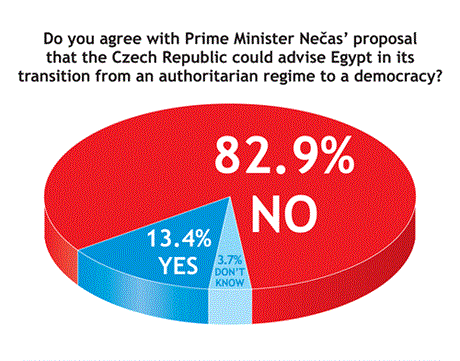The Czech Republic could advise Egypt, a country undergoing significant changes, and share its experience from the transition to democracy. So said Prime Minister Petr Nečas (Civic Democrats, ODS) proposed prior to the Feb. 4 European Union summit in Brussels. “It is primarily our experience with the establishment of some institutions and processes related to the country’s democratization and transformation into a fully democratic system that the Czech Republic can offer,” Nečas specified.
Scarcely ever do the top managers addressed in Czech Position “Voice of the Elite” poll agree so much in their opinion. This time, some 82.9 percent of respondents disagree with Nečas. And some answers from those who agree with him are so ironic that they can be considered negative, too. The case of undecided respondents is similar.
These three top managers are by no means sparing in their criticism of Prime Minister Nečas:
“Prime Minister Petr Nečas, or the government, want to meddle in the affairs of another country, even give it advice, instead of tackling the acute and topical problems they face at home,” the first manager said. ‘The prime minister is focusing his attention elsewhere and draws a red herring instead of dealing with domestic problems.’
“Just two explanations appear to be possible. The first is that we have already resolved everything in our own country and everything works smoothly — we have attained the phase of Heaven on Earth. The second is that owing to the numerous unpleasant things that must be tackled in our country the prime minister is focusing his attention elsewhere and draws a red herring instead of dealing with domestic problems. I cannot help but have the impression that the second option is more believable,” the first manager concluded.
“I totally disagree! It’s a ridiculous idea. The revolutionary events in Egypt don’t mean that their objective is to install democracy. And I don’t think at all that the Arabs long for any type of democracy. Prime Minister Nečas should come down to earth,” the second said.
The third claimed that the prime minister has no idea what he is talking about. “Egypt has totally different political problems with regard to the region it is situated in. The possible relaxation of the current regime would therefore look entirely different than the Czech process in the 1990s. The Egyptian economy also has a totally different structure to the Czech, planned, one. In addition, due to special revenues and expenditures, it works in a totally different manner,” this manager said.
“On top of that, we are well-known in Egypt as friends of Israel. That is why we are unacceptable for providing any in-depth expertise,” the third manager continued. “Hence, Nečas’s proclamation is the madcap idea of a minor politician of a small country who can just about see as far as his corrupt pond.”
Tongue-in-cheek support
The following two respondents give positive answers but ones filled with irony.
“I agree. … If we wish for Egypt to build a parody of democracy as weird as that which is in our country,” the first said. ‘The Czech Republic could also help Egypt eradicate corruption.’
“Of course, and that’s not all,” said the second. “The Czech Republic could also help Egypt eradicate corruption, put the judiciary in order and attain a balanced or even surplus budget. There are experts galore in all these issues among our politicians, and their results bear clear evidence of it. The best we can imagine would be that all our experts, for example, those specialized in democracy and fighting corruption, leave for Egypt and stay there until such time as they have accomplished their tasks.”
Another three negative answers highlight the historic, cultural and religious differences between the Czech Republic and Egypt.
“It is a world with totally different values, culture and religion. Wasn’t Egypt a stable country for several decades precisely due to its authoritarian regime? Isn’t the region’s stability a higher priority than ‘democracy in the Middle Eastern conception’? Is it possible and realistic to expect that Egypt and the Egyptians want and are able to live in democracy as we understand it? Are we able to understand Egypt’s specificities and help it? Does Egypt want and need to be given advice?” the first manager said.
“The Czech experience with the transition to democracy is barely applicable to Egypt due to its totally different history, culture, as well as religion,” the second manager said. “It would be a great error to take actions that the new political establishment in Egypt could perceive as yet another of the West’s endeavors to export its conception of democracy to the Arab world.”
The third also stated that there are enormous cultural and religious differences between the Czech Republic and Egypt. “The Czech Republic has merely linked up to the original democratic traditions; it was able to build upon the high level of education and did not have to tackle any religious and ethnic problems. Moreover, the Czechs are not inclined to violence and the army didn’t have a strong influence.
“Despite its official, relatively secular policy, Egypt is still a Muslim country with a little-developed middle class and a high percentage of illiterate people. It doesn’t have a democratic past and, due to its substance, cannot pass over to a Western-type democracy, at least not so rapidly. Egypt needs the rule of a strong hand in order to maintain order in the country,” the third manager continued.
“The former president, Hosni Mubarak, can be replaced either by a military dictatorship or a theocratic state. I consider the idea of establishing democracy in the conception of the Euro-Atlantic civilization naive. It has been demonstrated, for instance, by the problems with introducing democracy in Iraq after Saddam Hussein was toppled,” the third manager concluded.
A model of what not to do
Another three top managers state the reasons why the Czech Republic should not serve as a model for Egypt: ‘Our government should focus its energy on domestic reforms. Egypt will certainly find its advisers.’
“The Czech Republic managed the transition from the totalitarian regime to democracy very poorly in the political sphere and even worse when it comes to the economy. Bearing witness to this is, for example, the bad infrastructure, unfinished public finance reform, inefficient public administration, extremely rampant corruption in comparison with other civilized countries, and many other unresolved problems, which result in the Czech Republic’s relatively low competitive strength. Our government should focus its energy on domestic reforms. Egypt will certainly find its advisers,” the first manger said.
The second said the Czech Republic could successfully give advice as to the transition to a “play at democracy,” “Yet, after 20 or 30 years, democracy in our country usually comes to an end — similarly to the case of Hosni Mubarak’s regime. The only difference is in the scope and intensity of popular unrest and the number of the dead in the streets. In November 1989 one, even ‘fictitious’ death in Prague was enough,” the second said, referring to false reports that a student had been killed by police in 1989.
“I fully understand that [former Prime Minister] Mirek Topolánek might need a new job. Nevertheless, Egypt is a country so culturally distant that the Czech experience could only be applied there with great difficulty. I’m not even sure whether our transition to democracy was that smooth and worthy of following that we could boast about it around the world,” the second manger concluded.
“Applying our ‘privatization models’ and the Czech politico-economic culture, including the executive procedures controlled by the mafia, could result in the destruction of any country — Egypt too,” the final manager said. “Unless Prime Minister Nečas nominates advisers who would frankly tell the Egyptians what we have done wrong in the Czech Republic and what they should avoid. Yet Nečas, a long-standing member of the party that has made the most use of the Czech Republic’s ‘democratization,’ probably could not be as sincere as that.”





